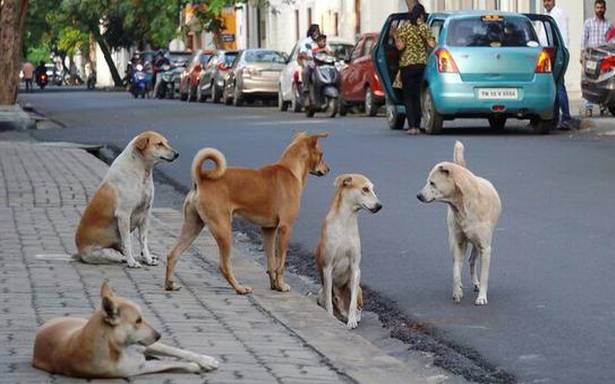A comprehensive programme involving licensing of pets and animal birth control can help control their numbers, says a veterinarian
Lack of proper rehabilitation and a systematic approach to carrying out the Animal Birth Control (ABC) Programme have led to a rapid growth in the stray dog population across commercial and residential areas.
Though in several areas, especially residential, the dogs live in harmony with the community, there are several incidents of stray dogs chasing cyclists and two-wheeler riders, leading to accidents and dog bite cases.
“It is a nightmare coming home during the night on a two-wheeler. It is not just one or two dogs chasing the rider. Three days ago, I was chased by a pack of strays near the Saram market. Only when the dogs started chasing a two-wheeler rider coming in the opposite direction could I escape,” said a government employee residing at Reddiyarpalayam.
According to a government veterinarian, not all urban free-ranging (as described in scientific literature) dogs are ferocious and attack human beings. “There could be cases of dogs in packs pouncing on people. But there are several cases of stray dogs living in peace with people. In fact, they are guardians as they don’t allow strangers to come, especially during the night. But it is better to control the stray dog population as they are poorly cared for, and in certain cases, are carriers of pathogens. They suffer deep wounds and go untreated. It is cruelty to the animal. So, it is better to bring down their population through the Animal Birth Control Programme and proper rehabilitation,” he added.
State Surveillance Officer, Health Department, Ravivarman, told The Hindu that the healthcare sector received dog bite cases, including from pet dogs, every day. In 2020, hospitals in the Union Territory treated 25,797 people for dog bites. Of the total treated, 19,667 are for mouthing by dogs, 1,718 for minor injuries and 3,543 for deep wounds. All of them were given anti-rabies vaccine (ARV). In cases of deep wounds and if the bitten dogs are dead, rabies immunoglobulin is also given in addition to the anti-rabies shot. Last year, the Health Department procured 53,000 vials of ARV and 780 vials of immunoglobulin.
“We can’t say all bites are due to stray dogs. Only about half of them will be due to strays, and mostly, the victims will be children,” Mr. Ravivarman told The Hindu. Pet dogs, according to the government veterinarian, are mostly vaccinated against rabies, which is not the case with urban free-ranging dogs. A dog census survey conducted a few years ago revealed that there were around 3,254 stray males, 2,402 females and 331 puppies in the Puducherry Municipality. In Oulgaret, there were 3,902 males, 3,016 females and 965 puppies, he said.
According to the veterinarian, a comprehensive programme involving the local administration, animal husbandry and health departments, pet owners and animal welfare organisations has to be evolved. “It is a misnomer to say that population of dogs on the streets increases because of stray dogs only. Even pet dogs or puppies of domestic dogs are abandoned for various reasons. We have to implement mandatory licensing, microchipping and annual registration of pet dogs. We should also increase the annual renewal fee for non-sterilised dogs from ₹100 to ₹1,000,” he said.
Along with the measures on the domestic dog front, the civic body should regularly carry out ABC programmes involving non-governmental organisations (NGOs). “Involving animal rights activist is very important in ABC and other programmes. They should set a target of sterilising 70% of the stray dog population in two years. Carrying out ABC programmes in intervals, and in small numbers, will not serve the purpose. Importance should be given for the proper rehabilitation of the sterilised dogs,” he said.
Veterinary Medical Officer, Puducherry Municipality, Thulasiraman, said a comprehensive ABC programme involving the Worldwide Veterinary Service, Udhagamandalam, Rajiv Gandhi Veterinary Hospital and NGOs was being evolved. The municipality has already identified 12 places in Puducherry for conducting the ABC programme. Even trained dog-catchers from Chengalpattu have been identified, he added.
“We want to do the ABC programme in a more systematic manner so that better results can be achieved. The local administration has given a clear instruction on carrying out the programme in a more scientific manner, including getting trained dog-catchers so that the canines do not get hurt,” Mr. Thulasiraman said.
Source: Read Full Article

